Whippet Dog
- January 31, 2024
- 0 comment
The Whippet dog is a breed known for its graceful and elegant appearance, coupled with remarkable speed and a gentle disposition. Originating in 18th-century England, these dogs were initially bred for their agility in hunting small game. They have a sleek and slender build, standing around 18 to 22 inches tall and weighing between 25 to 40 pounds.
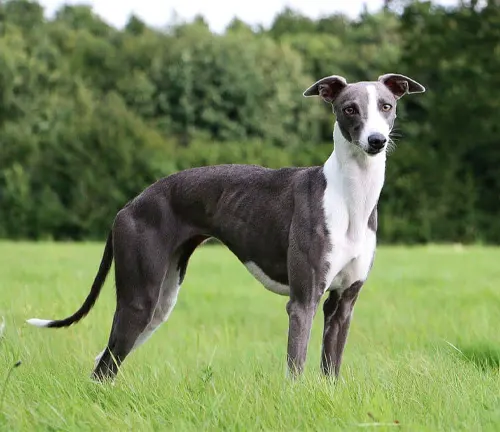
What truly sets Whippets apart is their astonishing speed, capable of reaching up to 35 miles per hour, making them one of the fastest dog breeds. Despite their athleticism, Whippets are gentle and affectionate companions, known for their love of lounging on the couch as much as sprinting across open spaces. With their low-maintenance grooming needs and compatibility with families, Whippets have rightfully earned their place as cherished and graceful canine companions.
| Specification | Description |
|---|---|
| Size | 18 to 22 inches at the shoulder |
| Weight | 25 to 40 pounds |
| Coat | Short, sleek, and various colors/patterns |
| Speed | Up to 35 miles per hour (exceptional speed) |
| Temperament | Gentle, friendly, and affectionate |
| Exercise Needs | Moderate, with occasional bursts of energy |
| Grooming Requirements | Low maintenance, regular brushing |
| Health Considerations | Genetic conditions (heart, hips, eyes) |
| Lifespan | 12 to 15 years |
| Compatibility | Good with children and other animals |
| Trainability | Intelligent and responsive to training |
Graceful, Gentle, and Great Companions
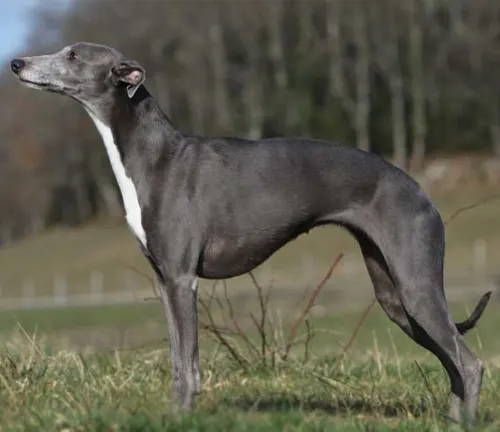
Whippet dogs are a breed that embodies grace, elegance, and affection in a compact package. With their slender bodies, charming personalities, and remarkable speed, they have captured the hearts of dog lovers worldwide. In this article, we’ll delve into the world of Whippet dogs, exploring their history, characteristics, care requirements, and why they make exceptional companions.
The History of Whippet Dogs
Origins in England
Whippets trace their origins back to 18th-century England, where they were bred for their exceptional agility and speed. They are a result of crossing small Greyhounds with Terriers and other small breeds, creating a dog that excelled in hunting small game.
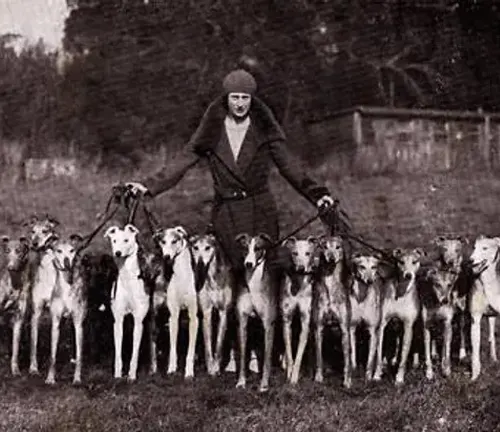
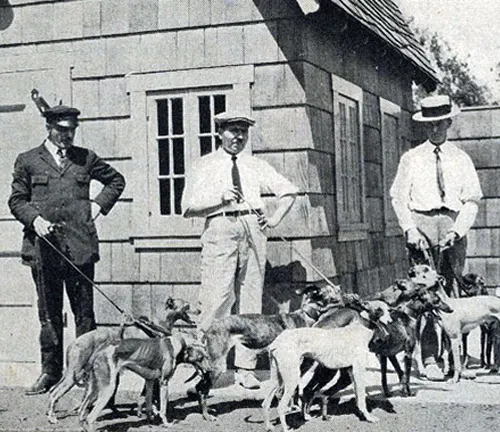
Emergence in the Industrial Revolution
During the Industrial Revolution, Whippets became popular among the working class for their ability to catch small game, such as rabbits, to supplement their diets. Their agility made them invaluable in the emerging sport of coursing.
Physical Characteristics
Size and Proportions
Whippets are medium-sized dogs, typically standing between 18 to 22 inches at the shoulder. Their height is well-balanced with their body length, giving them a harmonious appearance.
Weight
In terms of weight, Whippets usually tip the scales at around 25 to 40 pounds. This weight is proportionate to their height, ensuring they maintain their slender and graceful physique.
Short and Fine Coat
One of the defining features of Whippets is their short and fine coat. This sleek coat is low-maintenance, requiring minimal grooming. It lies close to their body, accentuating their contours.
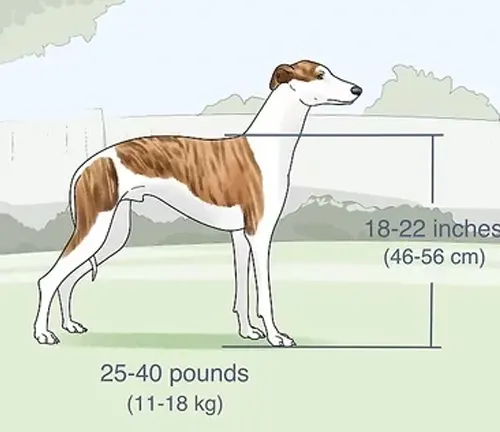
Variety of Colors
Whippets come in a wide array of colors and patterns. Their coat can be solid or feature various combinations of colors, including fawn, brindle, blue, black, and white. These diverse colorations contribute to their unique appeal.
Well-Defined Muscles
Despite their slender appearance, Whippets possess well-defined muscles, particularly in their hindquarters. These muscles are the source of their remarkable speed and agility.
Graceful Neck
Whippets have long and elegant necks that add to their overall grace. This feature enhances their regal presence and contributes to their stunning profile.
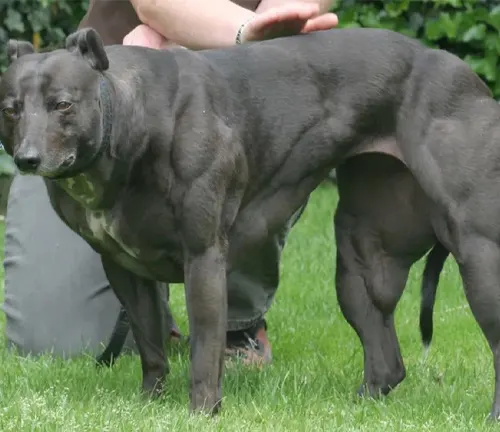
Elongated Head
Whippets have an elongated head that gives them a distinctive appearance. Their heads are well-proportioned to their bodies, creating a balanced look.
Expressive Eyes
Their eyes are bright and expressive, often coming in various colors, complementing their coat. These eyes radiate intelligence and curiosity, reflecting their alert nature.
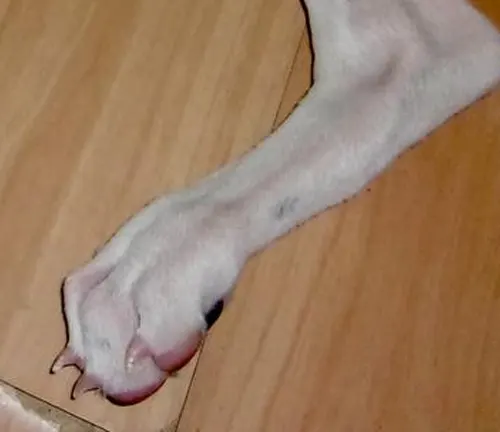
Slender Legs
Whippets boast straight and slender legs that support their agile movements. Their legs are strong but not bulky, enhancing their speed.
Arched Toes
Their feet feature well-arched toes and firm pads, which provide stability and support when running.
Slender Tail
Whippets have a slender tail that tapers to a point. This tail is carried low when they are at rest and is an extension of their graceful form.
Temperament and Personality
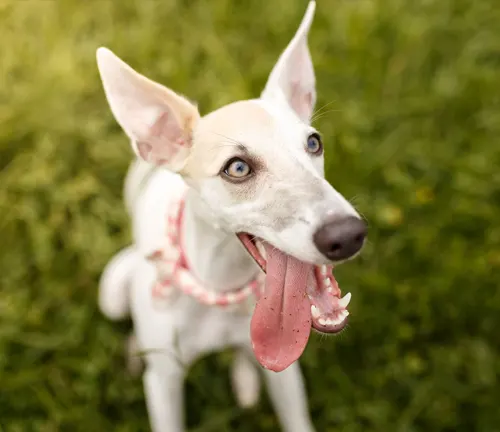
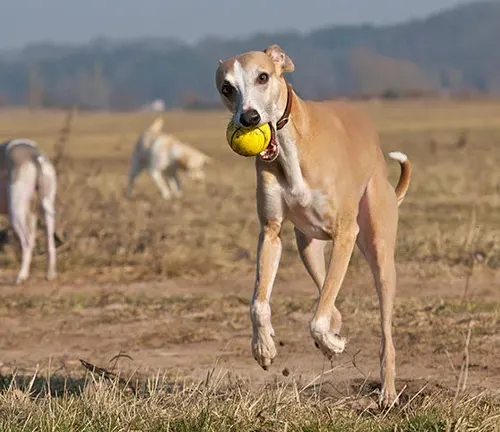
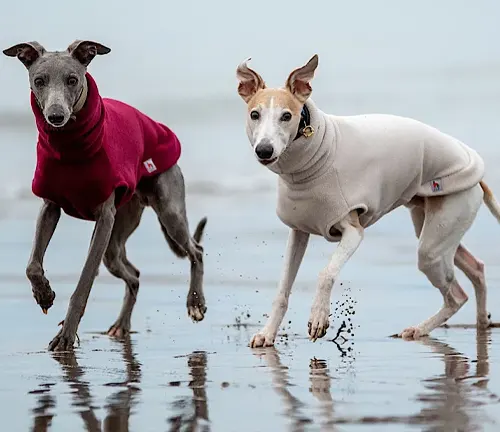
The temperament and personality of Whippet dogs are characterized by a unique blend of qualities that make them wonderful companions. Here are some key aspects of their temperament and personality:
- Gentle and Affectionate: Whippets are known for their gentle and affectionate nature. They are loving and devoted to their families, often forming strong bonds with their human companions.
- Quiet and Calm Indoors: Whippets are generally calm and well-behaved when indoors. They are content to lounge around the house, making them well-suited for apartment living or households with limited space.
- Playful and Energetic Outdoors: Despite their calm demeanor indoors, Whippets have bursts of energy when outdoors. They enjoy running and playing, especially in secure, open areas. Their remarkable speed and agility shine during these moments of play.
- Good with Children: Whippets are typically good with children. They are patient and gentle, making them suitable for families. However, as with any dog breed, supervision and proper socialization are essential when introducing them to young children.
- Social with Other Dogs: Whippets tend to be sociable with other dogs. They often enjoy the company of canine companions and can thrive in multi-dog households.
- Alert and Watchful: Whippets have an alert nature. While they are not typically aggressive or protective, they will alert their owners to any unusual sounds or activities, making them effective watchdogs in their own way.
- Independent Thinkers: Whippets are intelligent dogs, but they can also be independent thinkers. This means they may occasionally exhibit a stubborn streak when it comes to training. However, with positive reinforcement techniques and consistency, they can be trained effectively.
- Reserved with Strangers: Whippets are often reserved or aloof around strangers. While they are not aggressive, they may take some time to warm up to new people. Early socialization can help them become more comfortable around unfamiliar individuals.
- Low Maintenance: Their easygoing nature extends to their grooming requirements. Whippets have short coats that are low-maintenance and don’t require extensive grooming.
- Affectionate Lap Dogs: Whippets enjoy cuddling and being close to their human family members. They are known to be “velcro dogs” who love to share affectionate moments with their loved ones.
Care and Health Considerations


Taking care of a Whippet dog involves several important considerations to ensure their well-being and health. Here are some key aspects of care and health considerations for Whippets:
- Grooming Requirements: Whippets have short and fine coats that are relatively low-maintenance. Regular brushing to remove loose hair and occasional baths are typically sufficient to keep their coat in good condition. Due to their thin skin and lack of body fat, they should be protected from extreme cold weather.
- Exercise Needs: While Whippets are not high-energy dogs, they do enjoy outdoor activities and the opportunity to stretch their legs. Regular exercise is essential to keep them healthy and mentally stimulated. They particularly thrive when they have access to a securely fenced area where they can run and play off-leash.
- Nutrition: Providing a balanced and high-quality diet is crucial for Whippets’ overall health. Their diet should be appropriate for their age, size, and activity level. Consult with a veterinarian to determine the best feeding regimen for your Whippet.
- Regular Veterinary Check-ups: Whippets are generally healthy dogs, but like all breeds, they can be susceptible to certain genetic conditions. Regular visits to the veterinarian for check-ups and vaccinations are essential to monitor their health and catch any potential issues early.
- Heart Health: Whippets are known to be susceptible to heart conditions such as dilated cardiomyopathy. Regular heart check-ups and consultations with a veterinary cardiologist are recommended, especially as they age.
- Joint Health: Whippets may be prone to hip dysplasia, a common orthopedic issue in dogs. Keeping them at a healthy weight and providing joint supplements, if recommended by a veterinarian, can help maintain their joint health.
- Eye Care: Whippets can be susceptible to certain eye conditions, including cataracts and progressive retinal atrophy. Regular eye examinations can help detect and manage these issues early.
- Dental Health: Proper dental care is essential for Whippets. Regular brushing of their teeth and providing dental chews or toys can help prevent dental issues.
- Parasite Control: Protecting your Whippet from parasites such as fleas, ticks, and intestinal worms is crucial. Consult with your veterinarian for the best parasite control methods for your dog’s specific needs.
- Temperature Considerations: Due to their short coat and thin skin, Whippets are sensitive to extreme temperatures. In cold weather, they may require a sweater or coat to keep warm, while in hot weather, they should have access to shade and water to prevent overheating.
- Emotional Well-being: Whippets are sensitive dogs that thrive on human companionship. They should be part of the family and not left alone for extended periods. Loneliness and separation anxiety can be a concern if they are not given enough attention and interaction.
Whippets as Companions
Whippets are exceptional companions known for their unique blend of characteristics that make them cherished members of many households. Here’s a closer look at Whippets as companions:
Family-Friendly
Whippets are renowned for their family-friendly nature. They are gentle and patient, making them ideal companions for families with children. They often form strong bonds with family members and are known to be affectionate and loving.

Low Maintenance
Whippets are relatively low-maintenance dogs. Their short coats require minimal grooming, and they are generally clean dogs. This makes them an excellent choice for individuals or families looking for a canine companion without the burden of extensive grooming.
Adaptability
Whippets are adaptable dogs that can thrive in various living situations. Whether you live in a small apartment or a spacious home, they can adjust to their environment as long as they receive proper exercise and attention.
Lap Dogs
Despite their athleticism, Whippets are known to be “couch potatoes” indoors. They enjoy lounging on the couch and cuddling with their owners. Their calm demeanor indoors makes them perfect lap dogs, offering comfort and companionship.
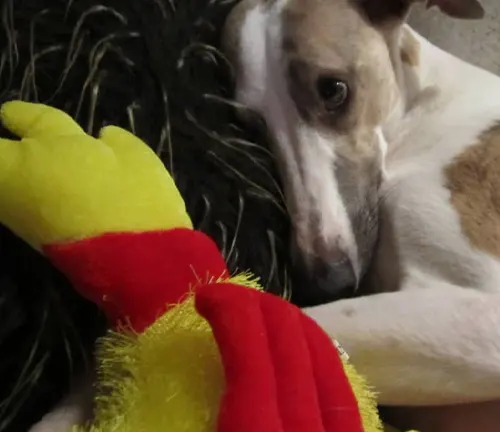
Playful Outdoors
Outdoors, Whippets are a different story. They have bursts of energy and enjoy running and playing. They are excellent at activities like fetch and love to stretch their legs in securely fenced areas. Their agility and speed are truly remarkable.
Good with Other Pets
Whippets tend to be good with other pets, including other dogs. Proper socialization from a young age is important to ensure they get along well with other animals in the household.
Loyal and Devoted
Whippets are loyal and devoted to their human companions. They often form strong bonds and are known for their unwavering loyalty. This devotion makes them great emotional support animals.
Intelligence
Whippets are intelligent dogs that can quickly learn commands and behaviors. While they can be independent thinkers at times, they respond well to positive reinforcement training methods.
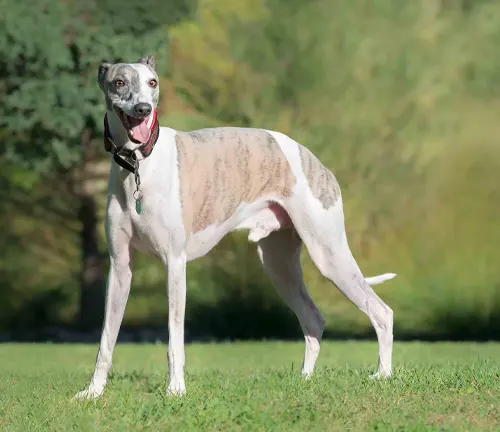
Sensitivity
Whippets are sensitive dogs that can pick up on their owner’s emotions. They are empathetic and often provide comfort when their owners are feeling down or unwell.
Quiet Demeanor
Whippets are not known for excessive barking, which makes them good neighbors in shared living spaces.
Travel Companions
Due to their adaptability and relatively small size, Whippets are excellent travel companions. They can accompany you on road trips and vacations, adding joy to your adventures.
Different Species
Fawn
Fawn Whippets have a solid tan or cream-colored coat with or without a few white markings. The color can range from a pale fawn to a darker, richer shade.
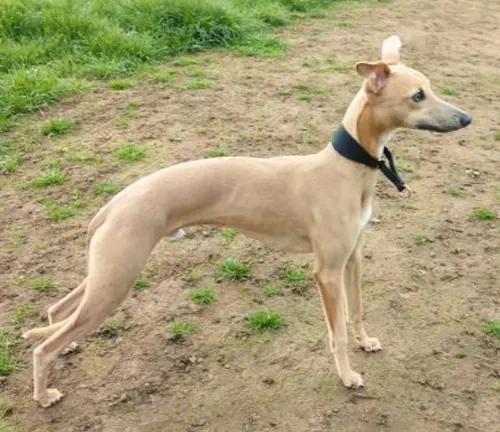
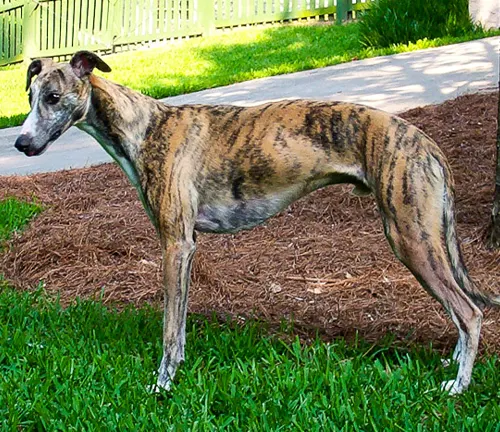
Brindle
Brindle Whippets have a striped or tiger-stripe pattern on their coat, typically consisting of dark stripes on a lighter background color. Common brindle colors include black brindle and blue brindle.
Black
Black Whippets have a solid black coat. While black is less common than other colors in Whippets, it is a recognized and accepted coloration.

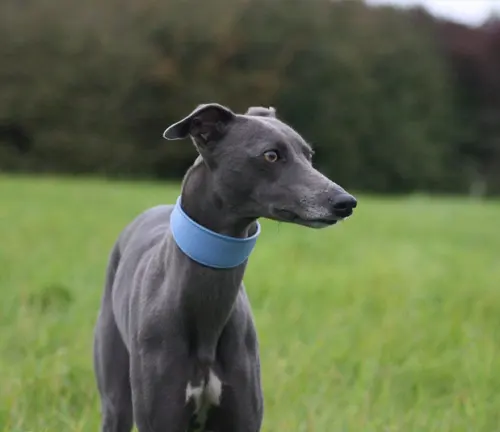
Blue
Blue Whippets have a solid bluish-gray coat. This color is a variation of the black coat but appears bluish due to a dilution gene.
White
White Whippets have a predominantly white coat with little to no color patches. They may have some small color spots on their body, but white is the dominant color.
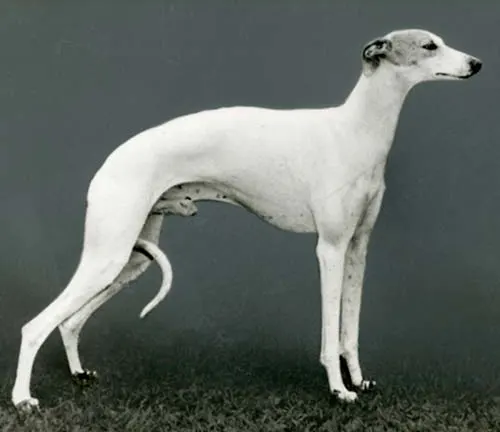
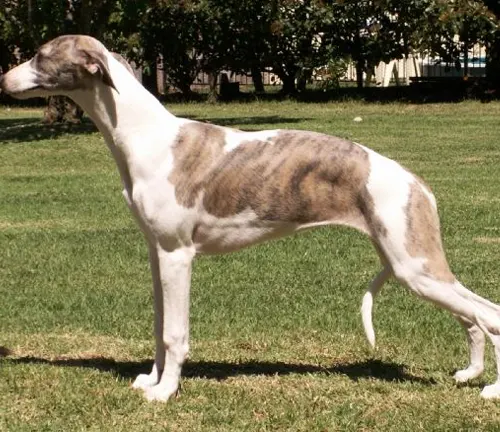
Parti-color
Parti-color Whippets have a coat with two or more distinct colors, such as a combination of black and white or fawn and white.
Masked
Some Whippets have a mask-like marking on their face, which is a darker coloration covering the muzzle and sometimes the eyes. This is often seen in fawn Whippets.

Frequently Asked Question (FAQs)
- What is the origin of the Whippet breed?
Whippets originated in 18th-century England, where they were bred for their agility and speed. They are a crossbreed of small Greyhounds and Terriers, developed for hunting and later became popular in the sport of coursing. - Are Whippets good pets for families with children?
Yes, Whippets are generally good pets for families with children. They are known for their gentle and patient nature, making them suitable companions for kids. However, supervision is essential to ensure both the dog and child interact safely. - How much exercise do Whippets require daily?
Whippets require moderate daily exercise, including a few short walks and opportunities to run and play in a secure area. They have bursts of energy but are not extremely high-energy dogs. - Do Whippets shed a lot?
No, Whippets have short coats and are considered low shedders. Their grooming needs are minimal. - What is the lifespan of a Whippet?
The average lifespan of a Whippet is around 12 to 15 years, which is relatively long for a medium-sized dog breed. - Are Whippets easy to train?
Whippets are intelligent and can be trained relatively easily, but they may have an independent streak. Positive reinforcement methods work well with them. - Do Whippets get along well with other dogs and pets?
Whippets are generally good with other dogs and pets, especially when properly socialized from a young age. They can thrive in multi-pet households. - Are Whippets prone to any specific health issues?
While Whippets are generally healthy dogs, they can be susceptible to conditions like heart issues (dilated cardiomyopathy), hip dysplasia, and certain eye problems. Regular veterinary check-ups are essential. - What is the typical temperament of a Whippet?
Whippets are known for their gentle, affectionate, and friendly temperament. They are often described as calm and loving companions. - Do Whippets make good watchdogs or guard dogs?
Whippets are not typically guard dogs. They are more likely to be curious about strangers than aggressive. They may alert you to unusual sounds but are not known for protective behavior. - Are Whippets hypoallergenic?
No, Whippets are not considered hypoallergenic, as they do shed some dander and have a coat that can trigger allergies in sensitive individuals. - Do Whippets need a fenced yard?
Whippets benefit from a securely fenced yard, as they have a strong prey drive and may chase small animals if given the chance. However, they can also adapt to apartment living with regular exercise. - What is the best diet for a Whippet?
The best diet for a Whippet should be high-quality, balanced, and appropriate for their age and activity level. Consult with a veterinarian to determine the most suitable diet. - Do Whippets require a lot of grooming?
No, Whippets have short coats that are low-maintenance. Regular brushing and occasional baths are usually sufficient for grooming. - How much should I expect to pay for a Whippet puppy from a reputable breeder?
The cost of a Whippet puppy from a reputable breeder can vary but generally ranges from $1,000 to $3,000 or more, depending on factors like pedigree and breeder reputation. - Are Whippets known for being escape artists or runners?
Whippets can be agile and may attempt to chase small animals if not in a secure area. It’s important to ensure they are safely contained when outside. - Can Whippets participate in dog sports or agility competitions?
Yes, Whippets excel in dog sports such as lure coursing, agility, and obedience competitions. Their speed and agility make them top contenders in these events. - What is the recommended age for spaying or neutering a Whippet?
The recommended age for spaying or neutering a Whippet is typically around 6 months of age. However, you should consult with your veterinarian for the best timing based on individual circumstances. - How do I socialize my Whippet to ensure it gets along with other dogs and people?
Socializing your Whippet from a young age is crucial. Expose them to various people, dogs, and situations in a positive manner. Puppy socialization classes can be beneficial. - Do Whippets have any specific dietary restrictions or allergies to be aware of?
While there are no specific dietary restrictions for Whippets, it’s essential to monitor their weight and ensure they receive a balanced diet to prevent obesity, which can lead to health issues. Some Whippets may have food allergies or sensitivities, so it’s important to be mindful of their individual dietary needs.




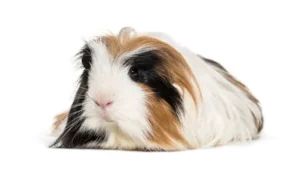
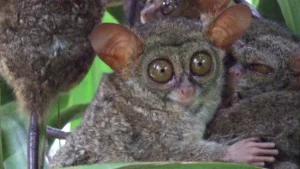
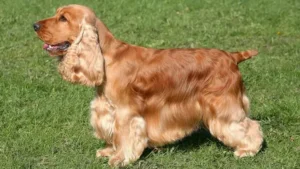

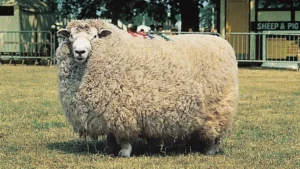


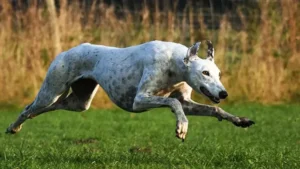


Leave your comment